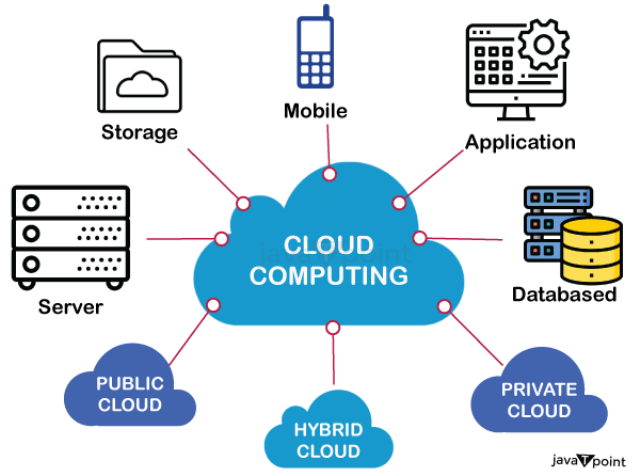Cloud computing is a transformative technological innovation that helps users to access and store data, applications on the internet. Instead of depending on local servers or personal computers.
The types of cloud computing sources can be labor intensive and expensive. Enterprises need to purchase physical machines along with other facilities via purchase procedures that may get a few months, as well as assistance the structures associated with cloud computing. The obtained techniques need a bodily area, usually the specific space along with adequate energy and also air conditioning. Right after setting up along with implementing the particular devices, corporations require professional staff to handle all of them.
This particular lengthy procedure is actually to be able to range whenever need surges or even company grows. Corporations may obtain much more computing assets compared to required, finding yourself together with lower usage figures.
Cloud computing tackles these types of problems by providing computing solutions because worldwide, on-demand solutions. Find out more about Search engines Impair, a set regarding cloud computing support versions provided by Yahoo and google.
Cloud computing described
Cloud computing may be the on-demand accessibility to computing sources (such as storage as well as infrastructure), since services on the internet. It removes the need for people and companies to self-manage physical assets themselves, in support of pay for the actual use.
The primary cloud computing service versions include facilities as a support offering storage space services, system as a service providing a develop-and-deploy environment to create cloud applications, and software as a service delivering programs as solutions. Additionally, courses like the AWS Course can enhance understanding and expertise in these areas.
Knowledge How Cloud Computing Performs
Cloud computing support models derive from the concept of spreading on-demand computing resources, software program, and information on the internet. Companies or even individuals spend to access the virtual swimming pool of discussed resources, such as compute, storage space, and social networking services that are located on remote control servers which are owned as well as managed through service providers.
One of the numerous advantages of cloud computing is you only pay so that you use. This enables organizations in order to scale quicker and more effectively without the responsibility of having to purchase and maintain their very own physical information centers and also servers.
Within simpler terms, cloud computing utilizes a network (most often , the actual internet) for connecting users to some cloud system where these people request along with access hired computing solutions. A main server grips all the conversation between customer devices in addition to servers to be able to facilitate the particular exchange of information. Security plus privacy functions are common elements to keep these details secure and even safe.
Whenever adopting cloud computing structures, there is no typical. What works great company might not suit you as well as your business needs. This versatility and flexibility is one of the distinctions of cloud, allowing corporations to rapidly adapt to altering markets or perhaps metrics.
You will find three various cloud computing deployment versions: public cloud, private cloud, and hybrid cloud.
Also Read: Online Cybersecurity Degree
Kinds Of Cloud Computing Deployment Designs
Public Cloud
Public clouds tend to be run through third-party cloud service providers. They provide compute, storage space, and system resources on the internet, enabling businesses to access discussed on-demand sources based on their own requirements as well as business objectives.
Private Cloud
Private cloud are built, handled, and possessed by a solitary organization and also privately managed in their personal data centres, commonly known as “on-premises” or “on-prem. ” They offer greater manage, security, along with management of information while nevertheless enabling inner users to profit from a distributed pool associated with compute, storage area, and community resources.
Hybrid Cloud
Hybrid clouds mix public and cloud versions, allowing organizations to take advantage of public cloud services and keep the security in addition to compliance abilities commonly present in private cloud architectures.
What Are The Kinds Of Cloud Computing Expert Services?
You will find three primary types of cloud computing support models that you could select in line with the level of manage, flexibility, as well as management your company needs:
Infrastructure as a service (IaaS)
Infrastructure as a service (IaaS) provides on-demand entry to IT facilities services, such as compute, storage space, networking, and also virtualization. It offers the highest degree of control more than your IT resources and many closely looks like traditional on-premises IT sources.
Platform as a service (PaaS)
Platform as a service (PaaS) offers all of the hardware along with software assets needed for cloud application advancement. With PaaS, companies may focus completely on software development with no burden of controlling and sustaining the underlying structure.
Software as a service (SaaS)
Software as a service (SaaS) delivers a complete application collection as a services, from fundamental infrastructure in order to maintenance, in addition to updates towards the app software program itself. The SaaS option would be often a good end-user program, where both service and also the infrastructure is actually managed plus maintained through the cloud company.
What Are The Advantages Of Cloud Computing?
It is flexible
Because of the architecture associated with cloud computing, enterprises and also the users may access cloud services through anywhere having an internet connection, running services upward or straight down as required.
It’s Effective
Enterprises produce new programs and quickly get them in to production-without stressing about the fundamental infrastructure.
It Provides Strategic Worth
Because cloud providers stay in the loop for of the most recent innovations and provide them because services in order to customers, corporations can get much more competitive advantages-and a higher come back on investment-than if they’d invested in soon-to-be obsolete technology.
It’s Safe
Enterprises frequently ask, Do you know the security risks of cloud computing? They may be considered fairly low. Cloud computing protection is generally named stronger compared to that within enterprise information centers, due to the depth as well as breadth from the security systems cloud companies put into location. Additionally, cloud providers’ safety teams tend to be known as best experts within the field.
It May Be Cost-Effective
What ever cloud computing service product is used, businesses only pay for your computing sources they use. They cannot need to overbuild data middle capacity to manage unexpected surges in demand or even business development, and they can easily deploy IT staff to operate on a lot more strategic endeavours.
How Cloud Computing Can Assist Your Business
The actual pace associated with innovation-and the advantages of advanced computing to speed up this growth-makes cloud computing. A viable choice to advance investigation and accelerate new product advancement. Cloud computing can give corporations access to worldwide resources and also the latest technology without needing to be worried about capital expenses or restricted fixed facilities. What is the method forward with regard to cloud computing? It’s likely to become the dominating enterprise IT environment.
In case your organization activities any of the subsequent, you’re most likely a good applicant for cloud computing:
- Higher organization development that outpaces structure abilities
- Low usage of existing structure resources
- Big volumes of information that are mind-boggling your on-premises data storage space resources
- Slower response times along with on-premises national infrastructure
- Delayed website cycles because of infrastructure limitations
- Cash flow difficulties due to higher computing commercial infrastructure expenses
- Extremely mobile or even distributed consumer population
- These types of scenarios need more than conventional data centres can provide.


